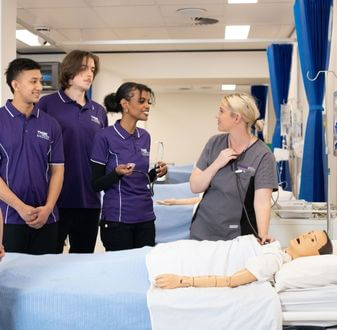With responsibilities ranging from implementing treatment plans and monitoring patients' progress to interacting with families and administering medications, there's not a lot that nurses don't do. Getting a Diploma of Nursing that equips you with a diverse skill set to showcase on your resume is key to landing a nursing job. Here are the top six skills to include on your nurse resume.
1. People skills
Statistics show that employers increasingly value candidates with a well-rounded skill set of both soft and hard skills. In nursing careers, in addition to advanced soft skills such as empathy, critical thinking, and clinical reasoning, people skills are especially important.
Whether you’re just starting your nursing career or you already have a few years of experience, you’ll need to showcase excellent people skills on your resume. Having good people skills will allow you to communicate effectively with patients and families, which helps to build rapport. This, in turn, will make you better equipped to deliver high-quality, personalised care, leading to a positive patient experience.
To show employers that you’ll be an asset to the team if hired, highlight your people skills throughout your application, both when you create your cover letter and when you write your resume.
2. Administrative skills
Your day-to-day duties as a nurse will largely revolve around patient care. However, in order to be successful in the profession, you’ll also need strong administrative skills.
Keeping detailed and accurate records is a must. When you’re seeing multiple patients with different needs each day, it’s essential to document when and what medication you administered, symptoms, and how patients are responding to treatment in order to ensure their treatment plan can be updated if needed.
To highlight your administrative skills on your resume and show that you’re ready for a nursing job, mention the experience you’ve gained working with medical administration software like MEDITECH and Epic Systems throughout your studies and through internships.
3. Teamwork
Whether you’re a travel nurse regularly switching between different healthcare facilities or you’re working in a nursing home, you’ll be collaborating with other employees on a daily basis. Employers need to know that you’ll be able to work well with all members of the healthcare team, including doctors, therapists, and other nurses.
When making your resume, the best way to showcase your teamwork skills is by providing specific examples of times when you collaborated with others in the past.
For example, if during your time as an intern, there was a time when the health care facility you were placed at was short-staffed, but you and the team worked together to ensure your patients received the best possible care, mention that.
4. Attention to detail
As a nurse, your job is to constantly monitor your patients and look for any changes in their condition. You need to be attentive to minute changes such as a decrease in blood pressure, an uptick in body temperature, and other signs that the current treatment plan is either working or that the patient is getting worse.
Regardless of whether you’re applying for a role at a hospital or as a children’s nurse in the community, highlighting the attention to detail on your nurse resume can help your application stand out. It reassures employers that you have what it takes to ensure your patients receive the care they need. In addition to including bullet points on your resume that showcase your attention to detail, use a professional template that is clean and doesn’t have distracting design elements.
5. Clinical nursing skills
Demonstrating clinical nursing skills is key when you’re applying for jobs. Here are a few basic and advanced skills to highlight on your nursing resume:
- Wound care: A foundational skill that all nurses should possess. Proper wound assessment, cleaning, and dressing application are necessary to prevent infections and promote timely healing.
- Medication administration: Knowing how to avoid medication errors by safely handling, preparing, and administering medications is critical if you’re looking for a job as a nurse. Even a minor mistake or deviation from established procedures could have disastrous consequences for the hospital and, more importantly, your patients’ health.
- Infection control: As a nurse, you must adhere to infection control procedures to prevent the spread of infections. Understanding proper hand hygiene, personal protective equipment use and isolation precautions is vital in safeguarding both patients and other healthcare providers from infections.
- IV therapy: An advanced nursing skill that requires expertise in venipuncture, knowledge of different IV solutions, and the ability to assess and prevent any complications that may occur. Mastering IV therapy is crucial if you’re working in critical care units, emergency departments, or other settings where patients require rapid and precise medication delivery.
- Critical care nursing: Requires specialised skills to care for patients with life-threatening conditions in ICUs. Your ability to make quick and accurate decisions can significantly impact patient outcomes in critical situations.
6. Stress management
Even if you’re not working in the emergency department, being a nurse can be stressful. Nurses are constantly exposed to situations that can take a toll on their mental and physical health if they're not adequately prepared.
Some benefits of working on your stress management skills include:
- Rational decision making
- Better communication with patients and families
- Increased patience and tolerance
- Reduced levels of fatigue
Convince hospital managers that you have the tools necessary to conquer work-related stress and maintain your composure by showing your ability to handle stress throughout your application documents.
Try to think of times when you were able to put your patients’ needs first, despite a hectic work environment. If you’re still not sure how to write a resume that demonstrates your stress management skills, check out nursing resume templates online for inspiration.




